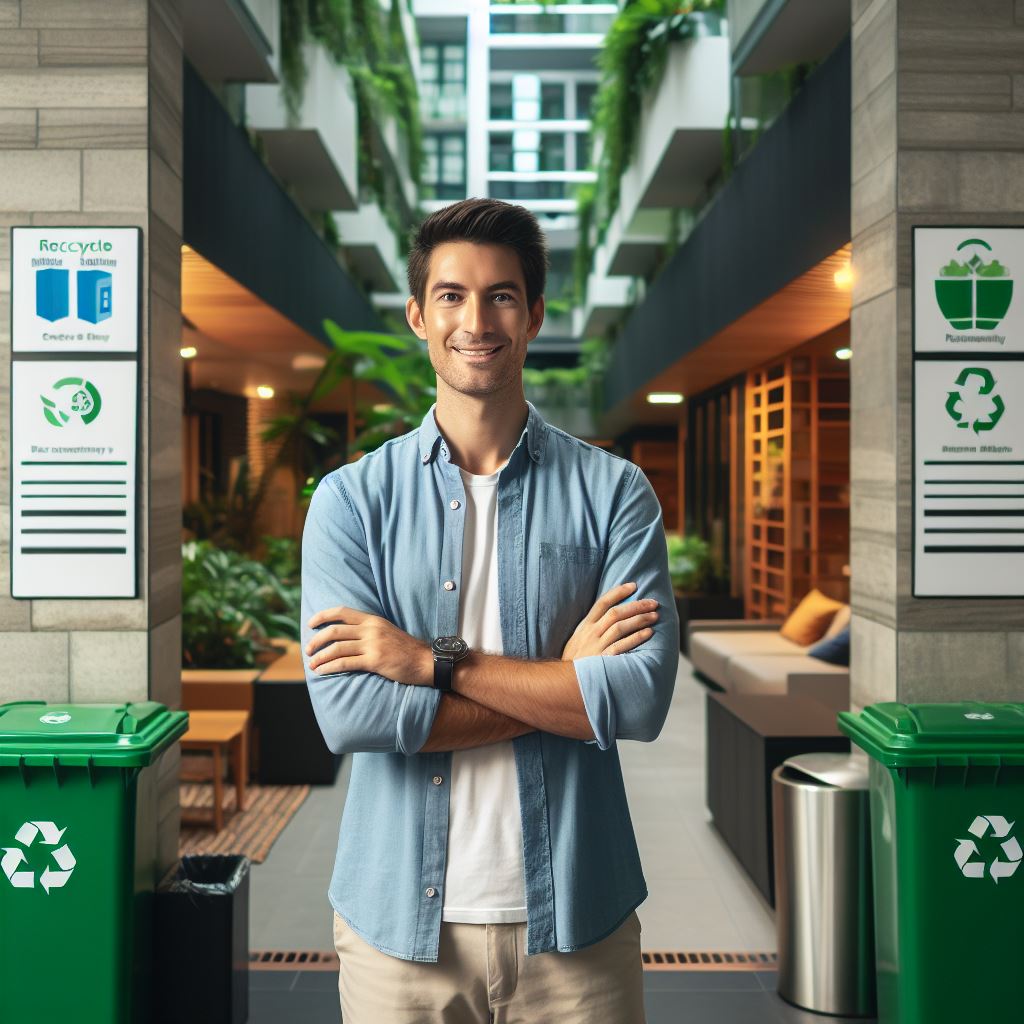Introduction
In the fast-paced world of urban living, apartment complexes have become a hub for diverse communities.
However, with this concentration of residents comes a significant environmental impact.
The importance of recycling in apartment complexes cannot be overstated.
As our cities grow, so does the need for sustainable practices to mitigate the ecological footprint of these communal spaces.
Recycling is not merely an individual responsibility but a collective effort that apartment dwellers must embrace to create a greener, healthier environment.
The purpose of this blog post is to equip apartment complex residents, management, and stakeholders with effective recycling strategies.
Beyond the conventional blue bins, successful recycling initiatives require thoughtful planning and community engagement.
By delving into innovative strategies tailored for apartment living, we aim to foster a sense of shared responsibility and inspire sustainable habits that can be seamlessly integrated into the bustling lives of urban dwellers.
Apartment living poses unique challenges to recycling efforts, such as limited space, varying levels of commitment among residents, and the need for streamlined processes. To address these challenges, we will explore practical solutions that turn obstacles into opportunities.
In fact, by understanding the importance of recycling in apartment complexes and implementing tailored strategies, we can transform these communal spaces into beacons of sustainability.
This blog post aims to guide apartment residents and management alike in creating eco-friendly environments that thrive on collective responsibility and conscious living.
Understanding the Challenges
Limited space for recycling bins
Apartment complexes are often built with limited common areas, leaving little room for dedicated recycling stations.
It becomes challenging to find an appropriate space for recycling bins that is easily accessible to all residents while not causing inconvenience or obstructions.
Property managers and residents may need to be creative in finding innovative solutions to make the most of the available space.
Installing compact recycling bins that can fit in smaller areas like hallways or parking lots can help maximize space utilization.
Collaborating with waste management companies that specialize in compacting recyclable materials can also be beneficial.
They can provide customized recycling solutions that fit within the limited space constraints of apartment complexes.
Lack of resident education on recycling
One of the major challenges faced by apartment complexes is the lack of resident education on recycling.
Many occupants may not be aware of the importance of recycling or how to properly separate their waste.
To address this challenge, property managers should prioritize resident education programs.
They can organize workshops or informational sessions to explain the benefits of recycling and provide guidelines on how to effectively recycle.
Posting clear and easy-to-understand signage in common areas and near recycling bins can also help educate residents.
The signs should include instructions on what can and cannot be recycled, along with the environmental benefits of recycling.
Difficulties in implementing recycling programs
Apartment complexes face difficulties in implementing recycling programs due to various reasons.
These can include financial constraints, lack of dedicated staff, and logistical challenges.
To overcome these obstacles, property managers can consider partnering with recycling organizations or waste management companies that offer comprehensive recycling services.
These organizations can handle the entire process, from providing recycling bins to collecting and processing recyclables.
Additionally, property managers can encourage resident participation by offering incentives such as reduced rent or rewards for active participation in recycling programs.
This can help create a sense of community responsibility and motivate residents to actively support recycling efforts.
Inconsistencies in waste management regulations
One of the challenges faced by apartment complexes is the lack of consistent waste management regulations.
Different municipalities or local authorities may have varying rules and guidelines for recycling, causing confusion and inconsistency.
Property managers should stay updated on the waste management regulations applicable in their area and communicate them clearly to residents.
Providing a comprehensive guide or online resources with information on local recycling guidelines can help eliminate confusion.
Collaboration with local authorities and waste management agencies is also crucial.
Property managers can actively engage with these organizations to understand the specific recycling requirements and ensure compliance with the regulations.
Read: Green Roof Benefits in Urban Properties
Strategies for Implementing Recycling Programs
Implementing recycling programs in apartment complexes can have a significant positive impact on the environment.
By following specific strategies and guidelines, these programs can be effectively implemented, leading to increased recycling rates and reduced waste.
Assess the recycling needs and resources of the apartment complex
Assessing the recycling needs and resources of the apartment complex is the first step in implementing a successful recycling program.
Evaluating the number of residents and their recycling habits will provide valuable insights into the program’s requirements.
Additionally, determining the available space for recycling bins and identifying any existing recycling infrastructure or contracts will help in planning and resource allocation.
Educate and engage residents
Educating and engaging residents is crucial for the success of a recycling program.
Informing residents about the benefits and importance of recycling will create awareness and encourage participation.
Providing clear guidelines on what can and cannot be recycled will prevent contamination and ensure proper sorting.
Organizing workshops or events can further promote recycling awareness and foster a sense of community involvement.
Improve accessibility and convenience of recycling
Improving the accessibility and convenience of recycling facilities is essential for encouraging residents to participate.
Installing easily accessible recycling bins in common areas, such as lobbies, hallways, and recreational areas, will make it easier for residents to dispose of recyclable materials.
Clear labeling of recycling bins will minimize confusion and prevent improper disposal.
Furthermore, considering the placement of recycling bins near trash chutes or dumpsters will make it convenient for residents to choose recycling over regular trash disposal.
Collaborate with waste management companies
Collaborating with waste management companies is crucial in ensuring the smooth operation of a recycling program.
Partnering with a recycling company for regular pickups will ensure that collected materials are properly processed and recycled.
Exploring options for on-site recycling facilities, such as compactors or sorting stations, can further enhance recycling efficiency.
Negotiating contracts with waste management companies will help ensure cost-effective recycling services, taking into account the needs and budget of the apartment complex.
By implementing these strategies, apartment complexes can significantly contribute to environmental sustainability.
Recycling programs not only reduce waste but also conserve resources and reduce pollution.
Engaging residents, increasing accessibility, and collaborating with waste management companies are key steps in achieving recycling success.
By working together, apartment complexes can make a positive impact on the environment and create a greener, more sustainable future.
Read: Eco-friendly Insulation in Property Mangement

Innovative Recycling Strategies for Apartment Complexes
In today’s world, recycling has become an essential practice for reducing waste and preserving the environment.
Apartment complexes play a significant role in promoting recycling strategies, as they house numerous residents who generate a substantial amount of waste.
To ensure effective recycling, innovative strategies can be implemented throughout these complexes.
Implement composting programs
One innovative strategy is to implement composting programs.
It is crucial to educate residents on the benefits of composting, such as reducing landfill waste and producing nutrient-rich soil.
Providing compost bins or designating communal compost areas within the apartment complex can encourage residents to participate actively in composting.
Set up a donation and exchange program
Another innovative strategy is setting up a donation and exchange program.
Creating a designated area for residents to leave unwanted items allows for easy donation and ensures they do not end up in landfills.
Simultaneously, encouraging residents to take items they need from the designated area promotes reusing and reducing wasteful consumption.
Establish a recycling incentive program:
To further incentivize recycling efforts, apartment complexes can establish a recycling incentive program.
This program can reward residents for their recycling efforts, such as providing reduced rent or gift cards.
Regularly tracking and calculating residents’ recycling contributions will allow for fair distribution of rewards and motivate residents to actively participate in recycling practices.
Implementing these innovative recycling strategies within apartment complexes not only benefits the environment but also creates a sense of community and responsibility among residents.
By actively participating in composting programs, residents can witness the direct impact of their actions on reducing waste and preserving the environment.
The donation and exchange program promotes a circular economy, ensuring unwanted items find new homes rather than contributing to landfill waste.
The recycling incentive program serves as an additional motivation for residents to prioritize recycling.
By providing tangible rewards, apartment complexes encourage sustainable practices and make recycling a more rewarding experience for residents.
The tracking and calculation process also allows for transparency and fairness in distributing rewards.
In essence, implementing innovative recycling strategies within apartment complexes is crucial for promoting sustainable practices and reducing waste.
Educating residents on composting benefits, providing donation and exchange opportunities, and establishing recycling incentive programs all contribute to a more eco-friendly living environment.
By encouraging active participation and rewarding residents for their efforts, apartment complexes can play a significant role in achieving a greener future.
Read: Sustainable Landscaping for Properties
Overcoming Common Challenges
One common challenge faced by apartment complexes when implementing recycling strategies is the limitation of space for recycling bins.
In densely populated areas, where apartment buildings are prevalent, finding adequate space to accommodate recycling bins can be challenging.
Addressing space limitations for recycling bins
To address this issue, property managers can explore compact or stackable bin options.
These bins are designed to take up less horizontal space while still providing sufficient capacity for recyclables.
By using these space-efficient bins, apartment complexes can optimize limited space and encourage residents to recycle.
Another creative solution is to utilize vertical spaces for bin placement.
Installing wall-mounted bins in common areas or near elevators and staircases can make efficient use of otherwise unused vertical space.
By placing bins strategically, residents can conveniently dispose of recyclables without taking up valuable floor space.
This option is particularly useful for smaller apartment complexes with limited outdoor or communal areas.
Improving resident participation and education
Improving resident participation and education is another challenge that apartment complexes face when implementing recycling strategies.
Oftentimes, residents may be unaware of the recycling policies or lack motivation to participate in recycling efforts.
To overcome this challenge, property managers can leverage digital platforms to provide recycling information and updates.
Websites, apps, or online portals are effective tools to communicate recycling guidelines, collection schedules, and any changes in recycling practices.
By utilizing these platforms, residents can easily access information and stay informed about the importance of recycling.
In addition to digital platforms, property managers can engage residents through regular newsletters or community meetings.
Newsletters can include recycling tips, success stories, and reminders about the benefits of recycling.
Community meetings provide an interactive platform where residents can ask questions, voice concerns, and share ideas.
These initiatives create a sense of community responsibility and motivate residents to actively participate in recycling efforts.
Handling inconsistencies in waste management regulations
Handling inconsistencies in waste management regulations, at both local and state levels, is another challenge faced by apartment complexes.
Recycling policies and guidelines can differ, leading to confusion among residents and property managers.
It is crucial for property managers to stay updated on local and state recycling policies.
This can be achieved by regularly checking government websites, attending educational workshops, or joining recycling associations.
By staying informed, property managers can ensure compliance with regulations and effectively communicate any changes to residents.
To address inconsistencies, property managers can also advocate for clearer and more unified recycling regulations.
This can involve collaborating with local authorities or initiatives to streamline waste management practices and create standardized recycling policies.
Clearer guidelines can simplify recycling processes for both residents and property managers, ultimately increasing recycling rates and reducing waste.
Overcoming common challenges in recycling strategies for apartment complexes requires innovation, education, and advocacy.
By addressing space limitations, improving resident participation, and advocating for clearer regulations, apartment complexes can successfully implement sustainable recycling practices.
Read: Water-Saving Tips for Property Managers
Conclusion
In the fast-paced urban landscape, apartment complexes play a vital role in fostering sustainable living.
Recycling within these communities is not just a choice; it is a responsibility.
As we navigate the complexities of modern living, it becomes increasingly imperative to embrace eco-conscious practices.
Recycling stands at the forefront of these efforts, offering a tangible way for apartment dwellers to contribute to a healthier planet.
Throughout this journey of sustainable living in apartment complexes, we’ve explored a myriad of strategies to seamlessly integrate recycling into daily life.
Starting with education, residents can be empowered with knowledge about the environmental impact of their actions.
Effective communication, strategically placed recycling bins, and streamlined collection systems are cornerstones for success.
Introducing composting options and collaborating with waste management services can further enhance the recycling ecosystem.
The adoption of technology, such as smart waste management apps, simplifies the process, providing residents with real-time information and promoting accountability.
Community engagement, through events and workshops, fosters a sense of shared responsibility, making recycling a communal effort.
As we conclude this exploration of recycling strategies for apartment complexes, the call to action is clear.
The success of these initiatives rests upon individual choices and collective efforts.
Implementing recycling programs in your apartment complex is not just an environmental contribution; it’s an investment in the well-being of future generations.
Take the first step by initiating conversations with neighbors, property managers, and local waste management authorities.
Advocate for the adoption of recycling bins, educational campaigns, and technological solutions.
Embrace the power of community, as change is most impactful when we stand united.
Remember, the future of our planet lies in the small actions we take today.
By prioritizing recycling in apartment complexes, we pave the way for a sustainable and greener tomorrow.
Let us be the stewards of our environment, turning every apartment complex into a hub of responsible living.
Together, we can create a world where recycling is not just a strategy but a way of life.




